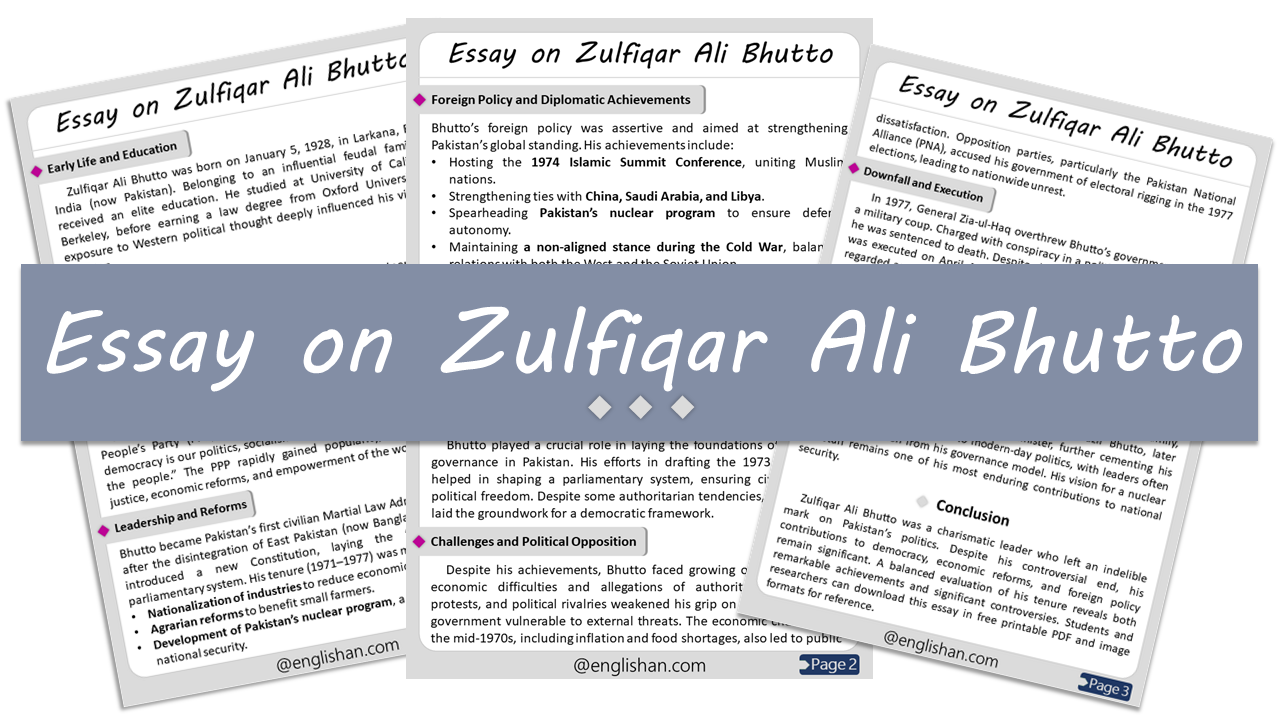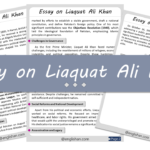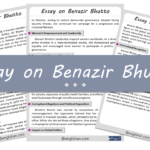When writing about Zulfiqar Ali Bhutto, it’s important to understand his role as a leader who worked to improve Pakistan’s economy, education, and defense. This essay on Zulfiqar Ali Bhutto explains his early life, political career, key achievements, and lasting impact. It’s written in 250 words to help middle school students with homework or exams. You can download this Zulfiqar Ali Bhutto essay as a free PDF or image to study or print.
10 Lines Zulfiqar Ali Bhutto Essay for Class 2 to Class 5
- Zulfiqar Ali Bhutto was a famous Pakistani leader.
- He was born in 1928 in Sindh, Pakistan.
- Bhutto studied law in England and returned to serve his country.
- He founded the Pakistan People’s Party (PPP).
- Bhutto became the Prime Minister of Pakistan in 1973.
- He worked to improve education and the economy.
- Bhutto helped Pakistan become a nuclear power.
- He played an important role in Pakistan’s politics for many years.
- Many people remember him as a strong and passionate leader.
- Bhutto’s leadership is still studied by students today.
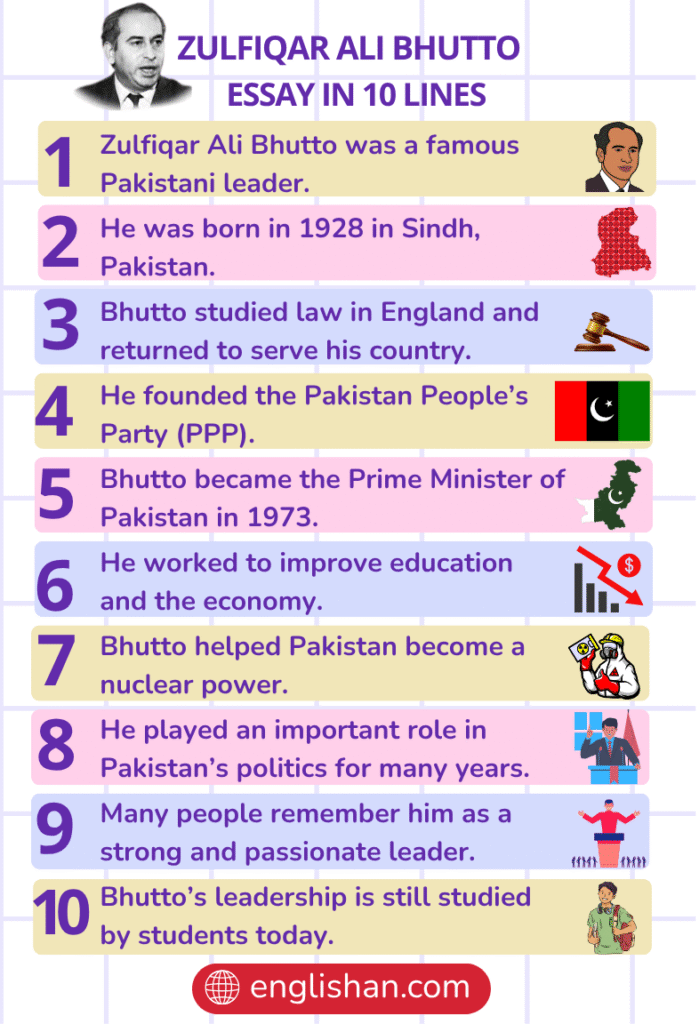
250 Words Essay on Zulfiqar Ali Bhutto for Middle School
Zulfiqar Ali Bhutto was a well-known leader and politician of Pakistan. Born in 1928 in Larkana, Sindh, he came from a respected family. Bhutto studied law at Oxford University in England and then at the University of California, Berkeley. After completing his education, he returned to Pakistan to help his country.
In 1967, Bhutto founded the Pakistan People’s Party (PPP), which aimed to serve the people and bring reforms. He became the President of Pakistan in 1971 and later the Prime Minister in 1973. During his time in office, Bhutto focused on improving Pakistan’s economy, education system, and healthcare.
One of his major achievements was Pakistan’s progress towards becoming a nuclear power, which helped strengthen the country’s defense. Bhutto also worked on land reforms to help poor farmers and introduced policies to promote industrial growth.
However, his political career faced many challenges, and in 1977, he was removed from power after a military coup. Despite this, Bhutto remains a significant figure in Pakistan’s history. His speeches and policies continue to inspire many.
This essay on Zulfiqar Ali Bhutto explains his early life, political achievements, and lasting influence. It is written in 250 words to help middle school students with their homework or exams. You can download this Zulfiqar Ali Bhutto essay as a free PDF or image to study or print.
500 Words Zulfiqar Ali Bhutto Essay for Upper Primary and Lower Secondary
Early Life and Education
Zulfiqar Ali Bhutto was born on January 5, 1928, in Larkana, British India (now Pakistan). Belonging to an influential feudal family, he received an elite education. He studied at University of California, Berkeley, before earning a law degree from Oxford University. His exposure to Western political thought deeply influenced his vision for Pakistan.
Entry into Politics
Bhutto entered politics in the 1950s and gained prominence during President Ayub Khan’s regime. He served as Foreign Minister (1963–1966) and advocated for closer ties with China while firmly opposing India. His stance during the 1965 Indo-Pak War strengthened his reputation as a nationalist leader.
Formation of the Pakistan People’s Party (PPP)
Disenchanted with Ayub Khan’s policies, Bhutto founded the Pakistan People’s Party (PPP) in 1967 under the slogan “Islam is our faith, democracy is our politics, socialism is our economy, and power lies with the people.” The PPP rapidly gained popularity, emphasizing social justice, economic reforms, and empowerment of the working class.
Leadership and Reforms
Bhutto became Pakistan’s first civilian Martial Law Administrator in 1971 after the disintegration of East Pakistan (now Bangladesh). In 1973, he introduced a new Constitution, laying the foundation for a parliamentary system. His tenure (1971–1977) was marked by:
- Nationalization of industries to reduce economic disparity.
- Agrarian reforms to benefit small farmers.
- Development of Pakistan’s nuclear program, a strategic initiative for national security.
Foreign Policy and Diplomatic Achievements
Bhutto’s foreign policy was assertive and aimed at strengthening Pakistan’s global standing. His achievements include:
- Hosting the 1974 Islamic Summit Conference, uniting Muslim nations.
- Strengthening ties with China, Saudi Arabia, and Libya.
- Spearheading Pakistan’s nuclear program to ensure defense autonomy.
- Maintaining a non-aligned stance during the Cold War, balancing relations with both the West and the Soviet Union.
Social Reforms and Public Welfare
Bhutto introduced significant social welfare policies, including improvements in education, labor rights, and healthcare. His government focused on providing free education, establishing new universities, and enhancing workers’ rights. He also implemented land reforms to redistribute wealth among rural communities.
Role in Strengthening Democracy
Bhutto played a crucial role in laying the foundations of democratic governance in Pakistan. His efforts in drafting the 1973 Constitution helped in shaping a parliamentary system, ensuring civil rights and political freedom. Despite some authoritarian tendencies, his leadership laid the groundwork for a democratic framework.
Challenges and Political Opposition
Despite his achievements, Bhutto faced growing opposition due to economic difficulties and allegations of authoritarianism. Strikes, protests, and political rivalries weakened his grip on power, making his government vulnerable to external threats. The economic challenges of the mid-1970s, including inflation and food shortages, also led to public dissatisfaction. Opposition parties, particularly the Pakistan National Alliance (PNA), accused his government of electoral rigging in the 1977 elections, leading to nationwide unrest.
Downfall and Execution
In 1977, General Zia-ul-Haq overthrew Bhutto’s government through a military coup. Charged with conspiracy in a politically motivated case, he was sentenced to death. Despite global appeals for clemency, Bhutto was executed on April 4, 1979. His trial remains controversial, widely regarded as a judicially flawed political assassination. The international community, including several world leaders, condemned the execution, considering it a politically driven verdict.
Legacy and Continuing Influence
Zulfiqar Ali Bhutto remains an enduring figure in Pakistan’s history. His democratic ideals, economic policies, and commitment to the nation’s sovereignty continue to inspire. The PPP, led by his family, upholds his political vision. Bhutto’s daughter, Benazir Bhutto, later became Pakistan’s first female Prime Minister, further cementing his legacy. His influence extends to modern-day politics, with leaders often drawing inspiration from his governance model. His vision for a nuclear Pakistan remains one of his most enduring contributions to national security.
Conclusion
Zulfiqar Ali Bhutto was a charismatic leader who left an indelible mark on Pakistan’s politics. Despite his controversial end, his contributions to democracy, economic reforms, and foreign policy remain significant. A balanced evaluation of his tenure reveals both remarkable achievements and significant controversies. Students and researchers can download this essay in free printable PDF and image formats for reference.
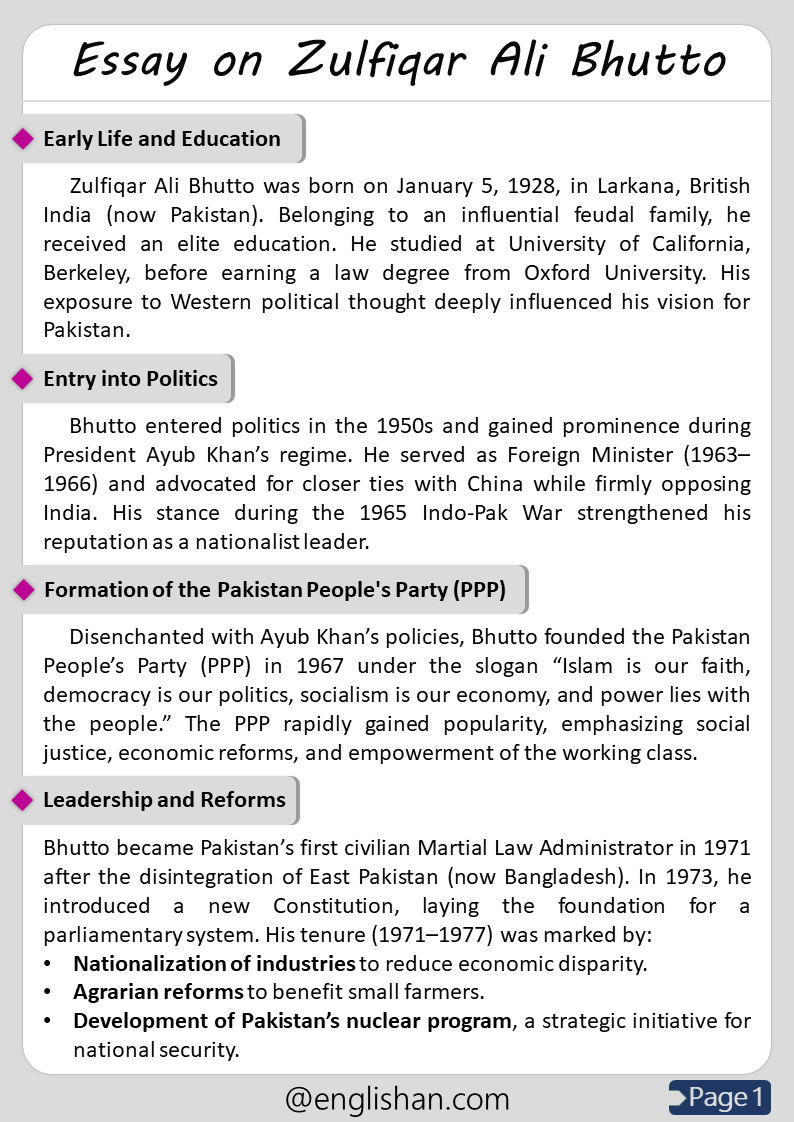
Difficult Words Used in 500 Zulfiqar Ali Bhutto Essay
| Word | Meaning |
|---|---|
| Feudal | Related to a system where landowners hold power over peasants. |
| Disenchanted | Losing belief or trust in something once admired. |
| Sovereignty | Supreme power or authority of a state. |
| Nationalization | The process of transferring private industries to government ownership. |
| Autonomy | The ability of a country to govern itself independently. |
Zulfiqar Ali Bhutto Essay PDF
You May Also Like
